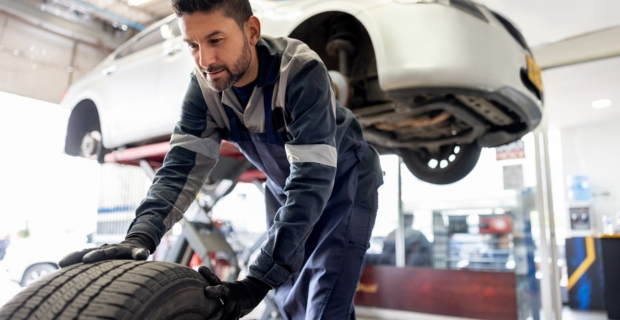Date Published: 2024/04/08
Read Time: mins
Spring car maintenance: Rust prevention tips after a harsh winter

Spring is finally here, and it's time to bid farewell to the winter blues and embrace the warmer weather. As the snow melts away, it's important to shift our focus to getting our cars ready for the new season. After enduring a tough winter with salt-covered roads, our vehicles need some extra care and attention to ensure they stay in top shape.
In this article, we'll explore essential spring car maintenance and rust prevention tips to help you prepare your car for the upcoming season and boost its longevity.
1. Take off your winter tires.
As the temperatures rise above 7 degrees Celsius, it's time to switch from winter tires to summer or all-season tires. Winter tires are designed for icy and snowy conditions, so using them in warmer weather can cause them to wear out faster. Remember to wash and spray the salt off your winter tires before storing them to prevent corrosion and ensure they’re ready for next winter.
2. Rotate your tires.
While changing your tires, consider rotating them as well. Tire rotation involves switching the position of your car’s front and rear tires. This simple step helps to extend the life of your tires while ensuring an even wear.
3. Wash the salt off your car.
Road salt can cause rust and corrosion on your car's body and undercarriage. Take your vehicle to a car wash that offers undercarriage cleaning to remove the salt and grime buildup. This will help prevent rust and keep your car looking its best.
4. Check the brakes.
Winter road conditions can be tough on your brakes. Have a mechanic inspect your brake pads and rotors to ensure they are in good condition. Neglecting your brakes can lead to costly repairs and compromise your safety on the road.
5. Top up your car's fluids.
Check your owner's manual for fluid replacement intervals. Spring is an excellent time to change your oil and check other fluids such as transmission fluid, coolant, brake fluid and windshield wiper fluid. Maintaining adequate fluid levels will keep your car running smoothly.
6. Change the air filters.
Replace both the engine air filter and the cabin air filter. The engine air filter prevents debris from entering the engine, while the cabin air filter ensures clean air inside the car. Changing these filters will improve engine performance and air quality.
7. Fix alignment issues.
Potholes and icy roads can knock your wheels out of alignment. Have a mechanic perform an alignment check and make any necessary adjustments. Proper wheel alignment improves your car’s handling, tire wear and overall safety.
8. Replace worn wipers.
Winter weather can damage your windshield wipers, leading to streaks and reduced visibility. Replace worn wiper blades to ensure clear visibility during spring showers.
9. Check the belts.
Winter conditions can strain and damage your car’s belt system, so it's important to check your belts and replace them if damaged. Pop the hood and inspect belts for cracks, fraying and brittle spots. On a serpentine belt, look for missing grooves and cracks. If you're unsure, consult a professional mechanic.
10. Check the lights.
While daylight hours may be getting longer, it's still important to have properly functioning lights. Check all your lights, including brake lights, headlights, turn signals, marker lights, daytime running lights, low beams and high beams. Replace any bulbs that are not working to ensure visibility and safety on the road.
11. Test the battery.
Extreme temperature fluctuations during winter can take a toll on your car battery. Test your battery's health using a battery load tester. If it's nearing the end of its lifespan, consider replacing it to avoid unexpected breakdowns.
12. Get a rustproofing service.
Consider getting a rustproofing service to provide an extra layer of protection against rust. This can be done through various methods such as electric modules, tar-based sprays or oil sprays. Consult a professional to determine the best option for your car.
By following these spring maintenance steps, you can prevent rust and ensure the longevity of your car. Taking care of your vehicle now will save you money on future repairs and keep you safe on the road. Remember, it's always best to consult a trusted professional if you're unsure about any maintenance tasks.
Review your car insurance coverage
Spring is also a good time to review your insurance policy to ensure you have the right amount of coverage. If you're a current Orbit policyholder and have questions about your car insurance policy, call an Orbit insurance broker to review your policy or learn more about your coverage options.
If you're shopping for car insurance and would like to request a quote, contact an Orbit insurance broker for a quote today!